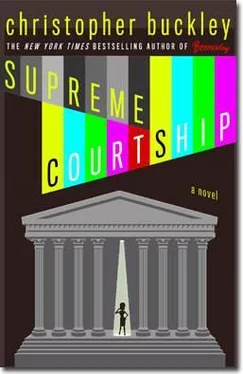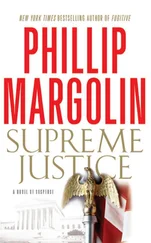“No. I had a little snort before the conference. I could drain an entire bottle right now, but I don’t think that would help.”
Silence.
“So, you all want me out of here?” Pepper said.
“No. It’s not that.”
“Well, what is it? You look like an armadillo just crawled up your butt.”
“Crispus told me.”
“Told you what?”
“About the FBI. About Haro.”
“Aw, he wasn’t supposed to do that.”
“I’m not sure where to begin. So I’ll start with the apology.”
“No one here owes me any apology.”
“I confronted Mike. Not in front of the others.”
“Was that smart, in the middle of this shit storm?”
“There’s a principle at stake here, Pepper.”
“I’m sick of principles. Vanderdamp ran on principle, and look what that accomplished. This country’s ready to explode. And we’re the detonators. Principles. Nothing but trouble. I don’t want to hear any more about principles.”
Declan seemed unsure how to process this declaration.
“So what did Mr. Justice Integrity have to say?” Pepper said.
“Not much.”
“He could always just deny it. I destroyed the evidence.”
“You’re about as adept at destroying evidence as you are at using our Intranet. Crispus dug the pieces of paper out of the wastebasket and taped them together.”
“That sneaky…”
“I showed it to Mike. I enjoyed that part. He went appropriately pale. Started blathering about gestapo tactics and criminal procedure. I was tempted to ask for his resignation.”
“Kind of draconian, isn’t it?”
“Draco is on the frieze in the Great Hall. You may have noticed.”
“I did. Along with Moses and the Ten Commandments, with his beard covering the Thou Shalt Not parts. You ought to do something about that, by the way. So where was it left?”
“It was left that he is going to apologize to you at conference, starting fifteen minutes from now. For impugning your integrity. Further, he is going to propose that you not recuse yourself. My sense is that the others will accede. As for the leak and the FBI, nothing more will be said, by anyone, to anyone. You might apologize to him for telling him to kiss your ass.”
“Slick, Chiefy,” Pepper said. “Real slick.”
“Yes,” Declan said. “It was, rather.”
THE VOTE on Mitchell v. Vanderdamp was 4-4. It fell to the juniormost justice to cast the deciding vote.
There had been vigorous discussion around the table. Normally, the Chief Justice did not encourage “debate,” preferring that these contentions be waged on the cooler battleground of written opinions and footnotes. Nine old farts sending footnotes to each other. But this was an unusual case, and sensing that a certain amount of face-to-face combat might be cathartic, he allowed it.
The four justices in favor of granting Mitchell’s motion clove to the (technical) argument that the term-limit amendment was in effect prior to the election, and that Vanderdamp’s election was thus null and void. The four justices in favor of denying the motion, and allowing President Vanderdamp to take office for a second term, made their stand on grounds of the larger issue, namely that the people-as in “We the People”-had elected him, amendment or no. They viewed with approval, too, Graydon Clenndennynn’s final (in so many ways) point that the Twenty-second Amendment was not “prospective.”
It got pretty heated. The word “goddammit” was uttered several times; the table was thumped; motivations subtly questioned; the Chief Justice had to interject, “Come on, now,” or “Please.” At one point, Crispus leaned over to Pepper and whispered, “This is better than Friday Night Smackdown.”
“Silvio,” said Justice Gotbaum, “you’re completely twisting what Bernstein said.” [33]
“I goddamn well am not. I do not ‘twist.’ ”
“Well, for your information, it’s a valid goddamn constitutional amendment. The Congress is the ultimate expression of the will of ‘the People.’ It has the superior claim to legitimacy-and therefore trumps-even the results of an election.”
“I’m with Mo,” Ruthless Richter said. “The principle here is precisely the same as in judicial review. We’re back to Marbury. And if you want to bring in law review articles, I’d refer you to Bill Treanor’s in Stanford Law Review. [34]As Justice Marshall observed in Marbury, ‘Ours is a government of laws, and not men.’ The amendment, adopted by ‘We the People,’ through the constitutional process, has a superior claim to legitimacy over an election result.”
“You make ‘election result’ sound like an abstraction!”
“I do not.”
“You do, too.”
“All right,” the Chief Justice finally said. “I think we’ve covered the ground.”
“Some of us covered it,” Silvio snorted. “Others stamped their little feet on it.”
“Bullshit!”
“All right,” Declan re-interjected. “Thank you, all.”
A heavy silence fell, like the one that hangs over a battlefield after the firing has stopped.
“Justice Cartwright?” he said. “How say you?”
5-4, SUPREME COURT DENIES MITCHELL’S MOTION, CLEARING WAY FOR VANDERDAMP SECOND TERM
Justice Cartwright, writing for the majority in denying Mitchell v. Vanderdamp, noted, “In finding for the President, we simply give effect to the principle of popular sovereignty that lies at the heart of our real founding document: ‘We hold these truths to be self-evident… that whenever any Form of Government becomes destructive to these ends, it is the Right of the People to alter or to abolish it, and to institute new Government, laying its foundations on such principles and organizing its powers in such form, as to them shall seem most likely to effect their Safety and Happiness.’”
She said to Declan, “When the going gets tough, the scared-shitless quote from the Declaration of Independence.”
“It’s not a bad place to take cover,” Declan said. He had voted in favor of Mitchell (albeit holding his nose), thus Pepper was spared a public racking for having taken the side of her “main squeeze,” as the Chief Justice of the Supreme Court was now often referred to in the media. Declan added, “I think in some ways, Pep, it’s your own declaration of independence.”
There were demonstrations calling for Pepper’s impeachment outside the Court, and a cascade of death threats. She and Ruthless Richter (who had voted for Mitchell) bonded over this aspect. They started making dollar bets as to whose daily mail would contain more threats and whose security detail was bigger.
Controversial though the ruling was, it was generally conceded that any ruling would have been controversial. There was, too, a sense of relief that the crisis was finally over. Though several senators stood on the floor to denounce the “Imperial Judiciary,” Congress as a body did not take up impeachment.
Less than an hour after the Court issued its ruling, President Vanderdamp appeared on television from the Oval Office. He thanked the Court and resigned the office of the presidency, “effective January nineteenth”-that is, one day before the inauguration. Vice President Schmidtz would become president. The very next day, he would be sworn in again, in front of the whole nation, to serve the term of office that had been granted President Vanderdamp by the Court; becoming, in the process, the first president in history to be sworn in twice on consecutive days.
Within hours of Vanderdamp’s announcement, the Speaker of the House of Representatives and the Majority Leader of the United States Senate-members of different political parties, moreover-appeared together on television to announce that they would introduce legislation calling for a repeal of the Twenty-eighth Amendment. The move was immediately hailed by a majority of the Congress; the bills were expected to pass and go on to the states for ratification. There was a practical reason: the Majority Leader was planning to run for president in four years, and did not relish the idea of going to the trouble only to be barred from having a second term. Democracy has its flaws, but it is (often) self-corrective.
Читать дальше











